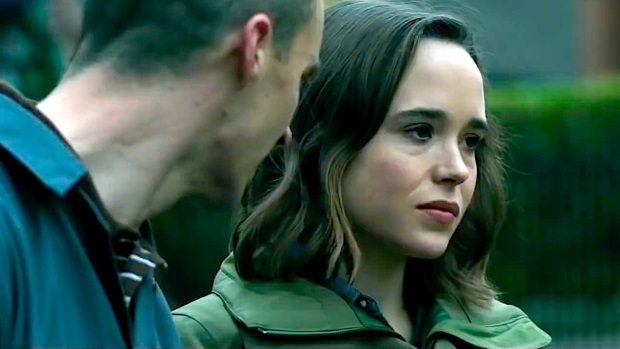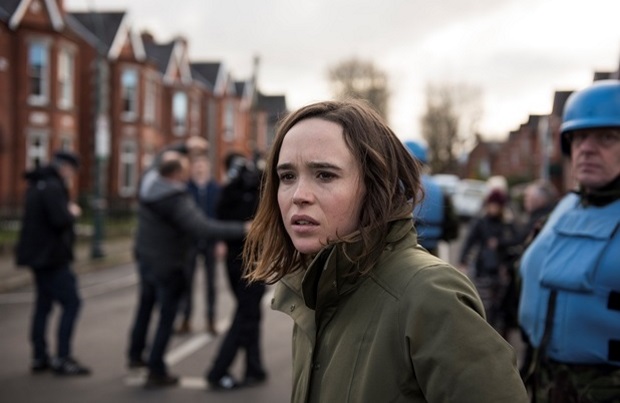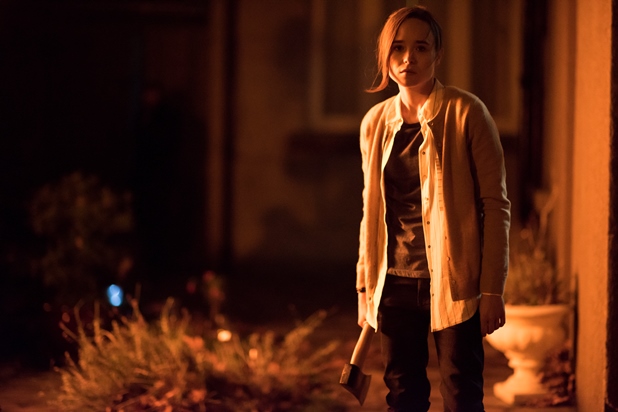Ellen Page interview: The Cured, zombies, producing and more
New horror drama The Cured explores what life for recovering zombies might be like...
First time feature director David Freyne’s movie, originally titled The Third Wave, continues the decades old tradition of the socially conscious zombie movie. The Cured is about reintegrating those cured of the maze virus into the society that they unwittingly tore to pieces. Recognisable divides, anger and the fear of further danger cause tensions to rise.
At the centre of the story is a makeshift family unit, with Abbie, a video news reporter, taking in her cured brother-in-law to live with her and her young son. Abbie is tough, tenacious and grieving the loss of her husband, who was killed in the wave of violence waged by the infected (we’re not using the z word).
Ellen Page, who plays Abbie, is likely to be well known to Den of Geek readers thanks to her role in the X-Men franchise and her turn in Christopher Nolan’s city-bending blockbuster heist thriller Inception. For this writer, Page has made her strongest impression in smaller films, such as Drew Barrymore’s roller derby smash ‘em up coming of age tale Whip It!, David Slade’s pitch black horror Hard Candy or James Gunn’s hyperviolent superhero cult classic Super.
Then, of course, there’s Juno, the 2009 smash hit indie teen comedy where Page earned an Oscar nomination for her role as spiky witted teen Juno McGuff.
To say that we were excited to get to talk to Ellen Page about her role in The Cured would be an understatement. To say that we skipped the Statham question in order to squeeze in a Juno question would just be a statement. Sorry. The moment came and I just wanted to ask about Juno.
Here’s how we got on with the friendly and thoughtful Ellen Page…
We’re talking about The Cured today. Zombie films have been really well mined in the last 15 years or so. What made you give this one a chance?
Well, first and foremost I just really loved David’s script. So that’s where I was coming from. Then, in terms of it being part of the genre, I did think it was just such an interesting new take, to be shooting a film where in some scenes you’re running from zombies and in the next you feel like you’re shooting a small family drama. I just thought it so interesting tonally and a new twist on the genre.
But mostly I just really liked David’s script and his short films. I was excited to be a part of it.
The film is really rich in subtext. There’s a lot going on beneath the surface drama. Did that all come across in the script?
I think what’s so interesting about it is everyone who, well not everyone, but there’s just so many varying perspectives of what it means to people or how they see it or what it represents for them. So I think it encompassed so many things. Mostly I’m focused on my character and finding my way into her in the story. But yes, of course that’s an element of it.

So when you’re playing the scenes, you’re not so much thinking about the overall theming as you are the character, and who and what’s around her?
Sure, yeah. Just from a direct actor’s perspective. Not that you’re not mindful of those other things, but first and foremost it’s about navigating how one feels is the true emotional response to the scene, I suppose.
One of the scenes that stands out is, I guess I’ll call it the revelation scene for the sake of spoilers. It’s a really heavy scene and your performance is fantastic in it. Does a scene like that take a toll on you? Is that a heavy day?
I mean, I think… sure. When you’ve done that scene you’re definitely exhausted emotionally, I’d say. You know at the same time, when you’re doing scenes like that and you’re working with someone that’s as extremely talented as Sam (Keeley), who’s such a wonderful actor to work with, there’s also something enjoyable in it. A challenge, on some level.
Sorry, that’s probably not a great answer. It’s hard to know how to describe.
Overall, it’s quite a sombre film. Does that translate to the set? I know it doesn’t always work that way on films.
No, it was such a delightful set-up. Working in Dublin was so lovely. David was just so amazing, especially considering it was his first feature, and with a lower budget. Quite a low budget and then so many big, big scenes, lots of backgrounds, military vehicles, just so much to take on in that short of a shoot. He was just so amazing and his energy was so positive and it was just the loveliest crew. So that made it really enjoyable to go to work every day.
I wanted to ask you about working with David as a first time director, actually. You’ve worked with some big name directors like Jason Reitman and Christopher Nolan, but you’ve really consistently worked with first time feature directors as well. Is there no trepidation that you might be getting into something that’s not so well controlled or assured?
No, I feel like if I respond to a script or a character or someone’s short films or what have you, I just get excited about the project. I’m not really, those aren’t really the thoughts I have. I just was such a fan of David’s work and also him as a person. And he really just blew me away with what he was able to do in that amount of time. It was such an ambitious movie.
On a small film like this, and I’m saying this as an outsider, it feels like there’s a balance of resources to freedom, where maybe by having a lower budget you have the freedom to do stuff you wouldn’t be able to do on a smaller studio picture. Is that the case and do you feel like the balance was right on this film?
I’d say that’s a fairly accurate. I mean, it can depend on the film, of course, no matter what size, in terms of ultimate creative freedom. But, this just felt like the most wonderful supportive environment in terms of helping David make the film he wanted to make. Again, all these people working so hard, it was just such a fantastic crew and group of producers. It did feel great in terms of what David wanted to do creatively.

You’re a producer on The Cured, and you have been on a few other films recently. What’s prompted you to take that step?
Well, I guess it sort of started relatively naturally, in terms of being fortunate enough to be in a position where I can do it. Also, to tell stories I’d like to tell. Or, for example, I produced a movie with Kate Mara that we star in together. We’re good friends, we wanted to work together, you don’t find that many scripts with two female leads, et cetera, et cetera. It’s a matter of that.
Of course, I made this show with Vice called Gaycation, and these other things that have come up with producing as well.
And when you’re producing a film like this, is there a greater feeling of investment or responsibility on your day-to-day on the set?
I feel like, in terms of producing, when I’m there as an actor I feel that’s definitely where more of the focus is. Not that I’m not being mindful of the other side of it. I think it’s just a part of what you’re taking on for that work, and so you work it out, you know?
Does producing give you a little bit more control, perhaps? Because films can change between when you sign on to what finally happens. Is it important to you to have a hand on the wheel?
Yeah. I mean, I like it because I sincerely enjoy it and I like learning about it, and I’ve been lucky to be working with wonderful people who I’ve learned a lot from. I like being involved, whether it’s the development of the project or in the edit, or so on and so forth. It’s just an enjoyable experience, and I hope to do it more or direct. It just feels like a good opportunity to learn about every aspect of what it means to make one these things, you know?
Was it fun to swagger around with an axe?
Honestly it was. I really enjoy the genre. I love 28 Days Later, I love a lot of post-apocalyptic movies of varying kinds. And so yeah, just running away from zombies, falling out of windows, all that stuff, I like. I turn into such a little kid with stunt stuff. I sincerely enjoy projects that have some kind of a physical element to them.

And it was always an axe? There were no email exchanges about you wanting a chainsaw or…?
No, no, no. I just did as I was told.
So, I know different actors have different approaches on this. Are you someone who can watch your own films back?
Yeah, I can. I’m such a small part of the equation, I really like watching the whole thing come together. I mean, there’s probably a couple I’ve never watched (laughs), for various reasons. But no, for the most part I’m just ‘Oh, there’s that’ and do my best to just focus on the experience of making something. Because you never have any idea of how things are going to turn out or do or all that stuff, so I just try to enjoy the making of it.
Have you rewatched Juno in the last while and how do you feel about it now?
I haven’t… oh yeah, actually I did. We did a live reading for the tenth anniversary in LA with an all-female cast. It was like, Kristen Wiig was Jason Bateman, Alia Shawkat was Michael (Cera). It was an awesome group. And so I rewatched it and then did the live read. It was a really special night, to be honest.
So yeah, I feel fondly about it. It felt fun.
Ellen Page, thank you very much!
The Cured is in UK cinemas from Friday.